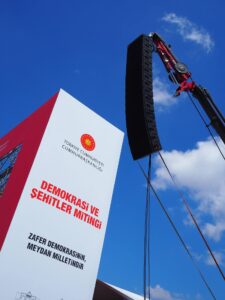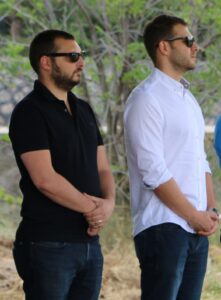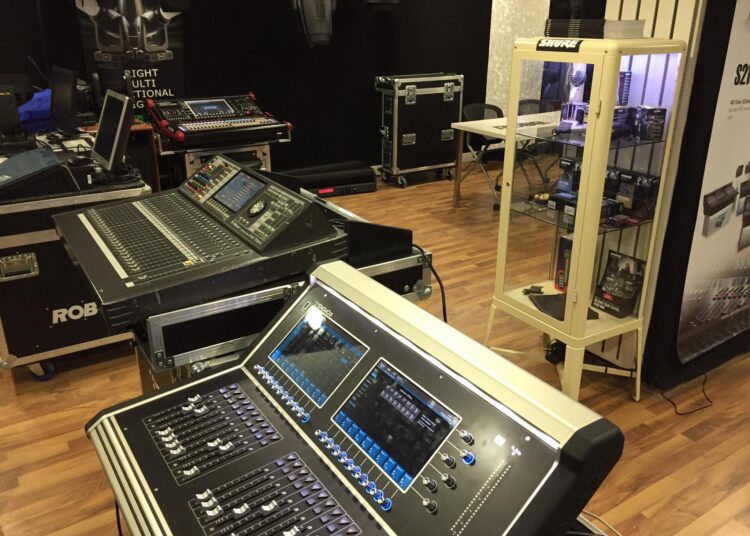Abdullah Bozkurt/Stockholm
A Turkish company that retrofitted President Recep Tayyip Erdogan’s lavish presidential palace with professional sound, visual, lighting and automation systems was hit with US sanctions after Washington determined that it poses a threat to US national security.
The US Department of Commerce’s Bureau of Industry and Security (BIS) added Atempo Proje Taahhüt Ses ve Görüntü Sistemleri A.Ş. along with two other Turkish companies to its Entity List on September 12, 2025, accusing them of diverting US-origin dual-use technologies to Russia in violation of US export controls.
The decision, published in the Federal Register on September 16, 2025, effectively prohibits US companies from exporting any items to the designated Turkish firms without a license — an authorization that the Commerce Department said would be reviewed under a “presumption of denial” policy, meaning that virtually no approvals are expected.
Atempo, headquartered in Ankara and operated by brothers Tayfun Konuralp and Volkan Konuralp, is well known in Turkey for its high-profile and lucrative government contracts, including major installations at the presidential palace complex (Beştepe Külliyesi), parliament and major airports. The company has long marketed itself as a leader in integrated audiovisual automation, boasting contracts with public agencies and defense-linked institutions.
Atempo’s commercial portfolio, as reflected in its own promotional materials and Facebook presence, showcases partnerships with several leading Western technology manufacturers whose products form the backbone of its audiovisual and stage installations. The company prominently advertises and distributes professional equipment from Shure (microphones and wireless systems), DiGiCo (digital mixing consoles) and Robe Lighting, Electronic Theatre Controls (ETC) and High End Systems (stage and architectural lighting technologies).
It also serves as the Turkish distributor for Sharp/NEC Display Solutions, supplying projectors and professional visual systems used in government and corporate venues. These affiliations underscore Atempo’s dependence on high-end Western technologies for its turnkey sound, lighting and automation projects — precisely the kind of dual-use components that US authorities fear may have been diverted to Russian end-users in violation of export restrictions.
According to the US notice, Atempo was designated along with EB Teknoloji Sistemleri A.Ş. and Dentun Elektronik, all accused of supplying or attempting to supply restricted US-origin electronic components to Russia following its invasion of Ukraine. The Commerce Department said the companies acted “in coordination” to conceal the identities of end-users for sensitive American goods.
The US government further designated Atempo and EB Teknoloji as “Russian Procurement Entities” under Section 734.9(g) of the Export Administration Regulations (EAR) — a status reserved for companies believed to be directly supporting Russian military or intelligence procurement networks. The move indicates Washington’s growing frustration with Turkey’s role as a transshipment hub for dual-use goods reaching Russia despite Western export controls.
Founded in the early 2000s, Atempo rose to prominence during Erdogan’s consolidation of power, securing a series of lucrative public contracts through the Presidential Directorate of Communications — the mammoth propaganda arm of the Erdogan regime — and several ministries. Its projects have included turnkey audiovisual installations at government complexes, military facilities and mosques financed by the TOKİ state housing agency.

Trade records show that Atempo imported American and European control systems, professional lighting and conferencing technologies typically used in high-end security environments. Its inclusion on the US blacklist therefore indicates that Washington suspects some of these technologies — or equivalent dual-use components — were re-exported to sanctioned Russian entities after 2022.
The BIS rule stated that the three Turkish entities “have engaged in conduct contrary to the national security or foreign policy interests of the United States,” specifically by “diverting or attempting to divert items subject to the EAR to Russia without authorization.”
Turkey’s trade with Russia has surged since Western sanctions tightened in 2022, with Turkish electronics exports nearly doubling. Although Ankara insists that it enforces only UN-mandated sanctions, Western officials have repeatedly warned of Turkish intermediaries helping Moscow acquire chips, sensors and communications components vital for its weapons programs.
In several earlier BIS actions Turkish companies such as Biopharmist Medikal Ürünler and BuyBest Electronic were also added to the Entity List for similar conduct. The September 2025 notice corrected identification details for those companies but reaffirmed their restricted status.
By designating Atempo, EB Teknoloji and Dentun Elektronik, the US signaled that it views these as part of a systemic diversion network emanating from Turkey, not as isolated violations. The “footnote 3” designation attached to two of the companies subjects any transaction involving them to the strictest possible controls under US export law.
The sanctions come at a delicate moment in US–Turkey relations, already strained by Ankara’s deepening defense cooperation with Moscow, its purchase of the Russian S-400 missile system and the slow progress in aligning export-control enforcement with NATO allies.

The Turkish government has not yet commented publicly on the designations. However, in previous cases Ankara has protested that “unilateral US sanctions undermine allied coordination.” Turkish business associations are expected to lobby for clarification, fearing reputational damage and the risk of secondary sanctions on companies trading in sensitive technologies.
The designations also serve as a warning to Turkish banks and freight forwarders involved in shipping high-value electronics. Compliance experts note that even indirect dealings with these entities could expose intermediaries to penalties or the loss of correspondent banking privileges in the US financial system.
Any ongoing Atempo projects involving US-made control processors, lighting boards or signal routers would now need to be suspended or sourced from non-US suppliers.

Washington’s move to sanction a company directly tied to Turkey’s presidential infrastructure sends a pointed political message: Even companies embedded in the upper echelons of Erdogan’s patronage network are not immune if they violate US export control laws.
The case emphasizes how Turkey’s strategic balancing between Russia and the West increasingly collides with Western enforcement regimes. For Washington the risk that US technology could flow — via Turkey — into Russian missiles or command systems outweighs the diplomatic sensitivities of targeting a NATO ally’s contractor.
Whether Ankara will respond by tightening export controls or by rallying politically against what it views as US pressure remains to be seen. But for now Atempo’s transformation — from prestige palace contractor to sanctioned entity — encapsulates the growing friction between Turkey’s geopolitical hedging and Washington’s national-security red lines.












